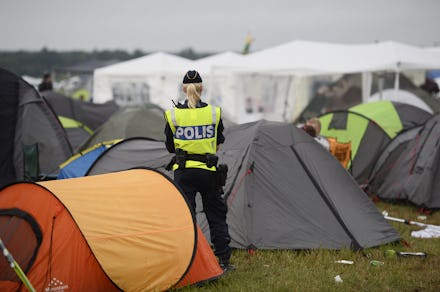Several Dozen Rapes Reported at Swedish Music Festivals — Adding to a Disturbing Trend

"Several dozen" — those are the words the Associated Press used to describe the amount of rapes that took place at two Swedish music festivals over the first weekend of July.
Thirty-two reports of attacks came from the three-day Party in the Park festival in the city of Karlstad, while five reported rapes and more than a dozen reports of sexual assaults came out of the Bravalla Festival, southwest of Stockholm.
"We're gutted by these hideous reports," Bravalla headliners Mumford and Sons wrote on their Facebook page. "We won't play this festival again until we've had assurances from the police and organizers that they'er doing something to combat what appears to be a disgustingly high rate of reported sexual violence."
Watching a band take a strong stand against sexual violence is a hopeful sign. However, Sweden's festivals are not the only ones facing a rape problem — it's a problem across the festival world, and festivalgoers need more than just the Mumford and Sons to start taking a stand.
Sexual assault at music festivals is rarely reported as throughly as it should. This is partially because they're excessively common and partially because music festivals don't see it being in their best interest to draw attention to them. Five reports of sexual assaults came out of Denmark's Roskilde the same weekend, reported the Associated Press, yet police officer Carsten Andersen described it as "nothing out of the ordinary at a such a large event, although every single case is too much."
At Glastonbury in 2015, there were three reported sexual offenses; two in 2014. Twenty-six incidents were reported in at Germany's Schlossgrabenfest in May 2016. Ottawa hospitals treated eight victims of sexual assault at music festivals in June 2013. In 2010, two women were raped at the Latitude festival, one by multiple men while she was off looking for a bathroom.
Considering the fact that two out of every three rapes go unreported, this is likely only a glimpse of the true extent of the problem that festivals do not seem ready to confront.
"Often they think 'bad publicity' before they think 'let's deal with it' whenever there's an incident of sexual assault," Dave Boardman, consultant for White Ribbon Campaign, a group of men and boys campaigning against violence against women, told Telegraph. "We're saying it's actually good publicity for them to say, 'We're doing what we can to keep women safe and get men to keep women safe.'"
Other groups face similar resistance for trying to spread information on consent and educate festival goers on what to do about assault.
"I guess events are concerned about being seen as a festival that's got a problem with sexual assault," Fleur Gardiner, the Safeguarding Adults Board Manager for the Isle of Wight Council, told Broadly. The changes they advocate for are setting up safe spaces for individuals talk about incidents and having independent sexual violence advisers, domestic abuse experts and sexual health nurses as part of festival staffs. "By embracing approaches such as ours they would actually be making their festivals safer spaces."
Ultimately, overcoming the resistance many music festivals seems to have in making comprehensive sexual assault resources available requires a shift in culture. It requires more education about the nature of consent. It requires festivals offering comprehensive guidelines for fans to rely on when faced with sexual assault, as Burning Man offered leading up to their 2015 festival "Help Prevent Sexual Assault in Black Rock City." It requires knowledge that bystander intervention can change the reality for many.
"Where do all the 'nice guys' go when girls are raped?" Swedish singer Zara Larson tweeted after the incidents at Bravalla came to light. "Are you too busy telling women how nice you are?"
One place to start is acknowledging that the escape from responsibility and consequence music festivals often advertise often comes with a dark side. "Many women say that being a victim of sexual assault is bad enough," as Boardman told Telegraph, "but people ignoring it makes it worse."
Read more: